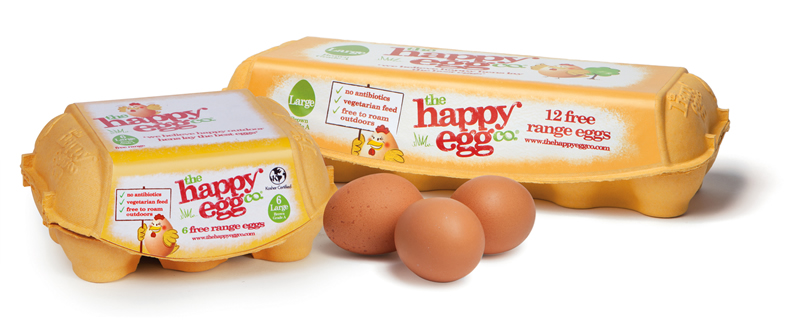
Noble Foods has passed the one million mark in the United States with its happy egg brand of free range eggs.
Noble, Britain's biggest egg packing company, launched happy egg in America in 2012 after establishing the brand in the United Kingdom, where it first appeared on supermarket shelves in 2009. By the time happy egg was named marketing initiative of the year in 2010 by the British Free Range Egg Producers' Association (BFREPA), it had established itself as the biggest brand in the United Kingdom egg category and accounted for 4.8 per cent of total egg market value. Noble said in its latest annual report that the brand had an annualised retail value of nearly £75 million.
The company now says it has sold more than one million dozen happy eggs in America, where consumers have been slower to embrace free range production than they have in the United Kingdom and Europe. However, although 95 per cent of the more than 90 billion eggs produced each year in the United States are from caged hens, the success of happy egg is helping to boost the free range cause in America.
Happy egg recently spoke out in the battle over hen welfare rules in California, where legislation was originally passed in 2008 to enforce improvements in the way laying birds are kept. There had been recent moves to introduce an amendment that would have nullified the animal welfare requirements, but the amendment was rejected by state legislators. The new legislation in California requires that laying hens will be able to turn around freely, lie down, stand up and fully extend their limbs while confined in their cages, and it has been welcomed by happy egg.
"We believe this is a major step in providing more humane living conditions for laying hens," said Andrew Joret, technical director of Noble Foods and chairman of the British Egg Industry Council. He wants to see more welfare improvements in bird welfare across the other side of the Atlantic. "We encourage egg farmers to go further and not just make the cages larger, but remove them all together. Hens should have daily access to roam outdoors. It is only natural."
Here in the UK, Noble recently ran a new high value television advertising campaign to raise the profile of the happy egg brand still further. The ads made their debut in the peak Saturday evening slot during ITV1's highly popular X Factor talent show and made further prime time appearances during other top ITV programmes like Downton Abbey and Coronation Street. The ad was created by the Clinton Partnership, whose other clients have included the Born Free Foundation and Pernod Ricard.
In the United States, the company's pitch to consumers is that it is committed to producing great tasting eggs laid by the happiest hens. It says it accepts only the highest standards of animal welfare for its laying birds. It says happy egg is the only 100 per cent free range on pasture egg company certified by Humane Farm Animal Care (HFAC) in the United States.
Happy egg entered the American market in October 2012 when its free range eggs were launched in more than 240 Kroger and Ralph’s stores in California. It now supplies more than 2,000 retail outlets, including the giant Walmart group, and its success during its first year and a half in America was recognised recently with a national award. Readers of the popular US title, Better Homes and Gardens, voted happy egg the best new product of the year in what is an annual award scheme.
David Wagstaff, chief operating officer of the happy egg co USA, said, "We are proud to accept the award and thrilled to be named a 2014 Better Homes and Gardens best new product. We are continually looking to challenge our own welfare standards to ensure our hens have the best. This award reaffirms something that we've always believed; with better treatment of hens comes a better tasting egg. It's gratifying to know that consumers in the US agree," he said.
David Wagstaff said an increasing number of American consumers were now turning to higher welfare production. “We are excited to see that US consumers are embracing our approach to hen welfare. As a result we have seen the brand go from strength to strength. The speciality egg market, which includes free range, is now predicted to grow by 15 per cent per year on year with cage free now accounting for four per cent of the total US egg market – which is a major achievement and something worth celebrating, particularly for the happy egg company, which puts hen welfare first.”
Rob Newell, head of brands at the happy egg co, said, “It’s really great to reach this milestone so quickly and to witness the positive reaction from consumers to free range. Per head US consumers eat around 250 eggs every year – 1.3 times more than here in the UK, representing a tremendous opportunity for the future growth of our brand.”
Happy egg reportedly entered the United States market with a target of achieving £100 million in sales, although without setting a timescale for achieving this target.
